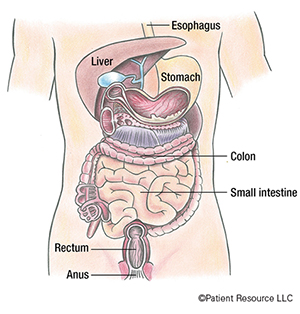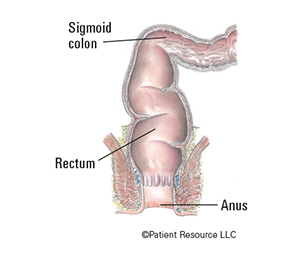Anal Cancer
Overview
Anal cancer begins when healthy cells in or on the anus change and grow out of control, forming a mass called a tumor. Squamous (SKWAY-mus) cell carcinoma is the most common type of anal cancer diagnosed in the United States. It begins in the squamous cells lining most of the anal canal and the anal margin. Squamous cell carcinomas in the anal canal have grown beyond the surface and into the deeper layers of the lining.
Cloacogenic (kloh-A-koh-jenik) carcinoma (also called basaloid or transitional cell carcinoma) arises between the outer part of the anus and the lower part of the rectum. It likely starts from cells that are similar to squamous cell cancer.
Other types of anal cancer include adenocarcinomas, basal cell carcinomas, melanomas and gastrointestinal stromal tumors (GISTs).
To better understand your diagnosis, it may help to know more about the anus and surrounding areas. The anus is the opening at the end of the large intestine, below the rectum, where bowel movements leave the body. It is formed partly from the outer skin layers of the body and partly from the intestine. Two ring-like muscles, called sphincter muscles, open and close the anal opening. These muscles contain stool until it is released during a bowel movement. The anal opening is connected to the rectum by the anal canal, which is about 1-1/2 inches long and extends from the rectum to the anal verge. This is where the canal connects to the outside skin at the anus called the perianal area.


Anal cancer is rare, making it important to find a physician with experience treating it. You’re encouraged to seek a second opinion with an expert as well as the support of others whose lives are affected by this diagnosis.
Support for Anal Cancer Thrivers
Due to its rarity and the stigma associated with the disease, people with anal cancer traditionally haven’t had access to many resources. The Anal Cancer Foundation, a non-profit organization founded in 2010, strives to remedy that by offering hope and help to people diagnosed with anal cancer and their loved ones. Members of the foundation know the value of talking with someone who understands what you’re going through, so along with providing educational information about anal cancer, treatments and side effect management, they are proud to offer a Peer-to-Peer Support Program. The program, a free service provided by the Anal Cancer Foundation, matches anal cancer thrivers and their caregivers with volunteers who are thrivers or caregivers. To learn more about this program or to be matched with a peer, visit www.analcancerfoundation.org


